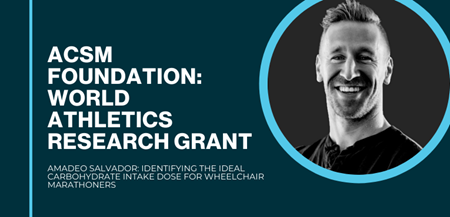ACSM's Foundation Research Grant Program |
Dec.
15, 2021

The ACSM Foundation awards several grants each year to student and early career professional members who are conducting research in the fields of exercise science and sports medicine. One of those grants is the World Athletics Research Grant, funded by the
World Athletics Federation, one of the most globally influential sport governing bodies. The $5,000 grant is made available to a doctoral student whose research proposal is in the area of physical activity, training and human performance relative to athletic events.
The recipient of the 2020-2021 World Athletics Research Grant is Amadeo Salvador, for his research, "Identifying the ideal carbohydrate intake dose for wheelchair marathoners." Learn more about Amadeo and his research:
The focus of your research is quite specific. What attracted you to this topic?
The combination of nutrition and exercise was always a passion of mine, and as a former exercise physiologist optimizing nutrition to enhance exercise performance is quite challenging. When we focus on athletes with spinal cord injury, the challenge is even greater. This is due to a dearth in the body of literature relating to para-athletes in addition to the significant individual variances between injury types.
During my Ph.D., I was able to interact with Adam Bleakney, head coach of the United States Paralympic Wheelchair racing team as well as the University of Illinois wheelchair racing team. His passion and knowledge for the sport motivated me and our team to pursue this research area. Importantly, Dr. Liz Broad, the nutrition expert behind Team USA’s Paralympic athletes, also played a fundamental role in our understanding of the applied arena which helped us form our hypothesis.
Briefly, can you describe your methodology?
The methodology used in the research we proposed is a combination of knowledge that I acquired during my Ph.D. under Dr. Nicholas Burd and during my master's degree under Dr. Fabrizio Caputo. We will utilize measurements of carbohydrate and fat oxidation to assess how much of the carbohydrate (CHO) drink provided during the marathon simulation was used by the athletes. We also will utilize lactate and VO2 kinetics analyses to first, better characterize the athletes, and second to better understand how nutrition, in our case specific CHO, will affect these measurements of bioenergetics.
How will you collect your data?
Unfortunately, due to COVID-19 and the changes in dates of the Tokyo Paralympics, our data collection has been delayed for the safety of our participants and for respect of their primary goal which is to represent their country. We are excited for the findings that are to come.
What do you hope will be the impact of your research?
We believe that the better characterization of these athletes’ energy systems and how their physiological responses to different doses of CHO will be quite helpful for coaches and sports dietitians. They will be able to create more optimal fueling recommendations not only during competition, but also during the daily training activities.
What future research topics do you hope to pursue?
Currently, I am a postdoctoral research fellow at the University of Missouri under the mentorship of Dr. Elizabeth Parks and Chi-Ren Shyu. My postdoctoral work will focus on the combined effect of aerobic exercise and caloric restriction in non-alcoholic fatty acid liver disease (NAFLD), as well as mechanisms of NAFLD progression and regression.
Applications for the 2022 World Athletics Research Grant are now being accepted. You can learn more here.
*Doctoral students enrolled in-time programs are eligible to apply. Applicants for student research grants must have graduate student status during the term of the grant to be considered for funding. Applicants must be current ACSM members.